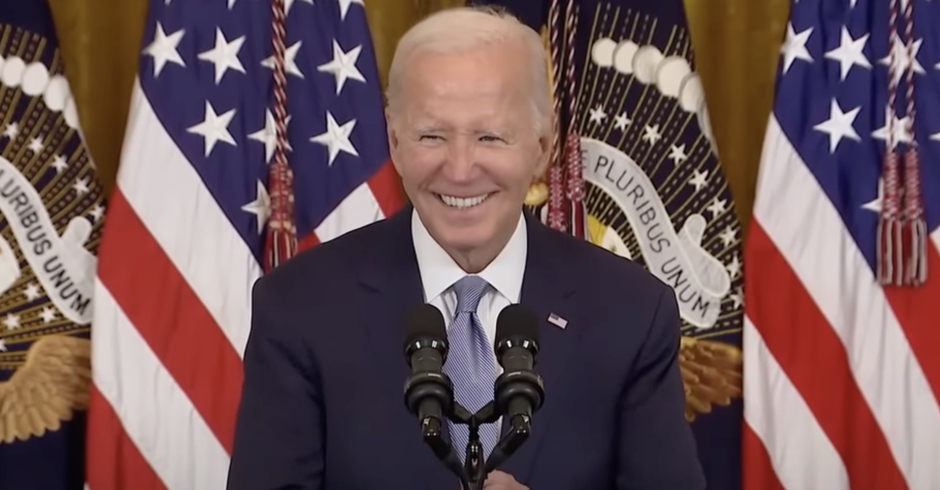10 Years Into 9/11: A Look At America’s Internal Us vs. Them Nationalism
Nationalism isn’t just about Us vs. Them, it’s reliant on the marginalized and the “deviant.” They help us define who “we†are, and it comes at a high cost: justice. Ten years into 9/11, Joanne Kalogeras explains, from London.
I was at home in San Francisco on 9/11/01. I could go on about what I saw and how I felt after my sister’s phone call roused me from bed and drove me to the television set, but you’ve heard it all before, a thousand times. Shock. Fear. Confusion. Then, later that evening at a Castro Street bar, trying to make sense of it, Earthquake Love (what Californians call the strong social bond many feel towards each other in the face of an emergency or disaster).
The following week, I thought about odd things to be grateful for. My father had passed away six months earlier, and I still don’t like to think of how he would’ve taken those events. The person videotaping George Bush’s deer-in-headlights reactions upon hearing the news from his aides. The Onion rising to the occasion magnificently: “Rest of Country Temporarily Feels Deep Affection for New York”.
Which, by the way, is just how I like my patriotism, if I must have it at all: with humorous affection and a resistance to taking it too seriously. The stomach-churning nationalism the country has descended into since 9/11 is not simply senseless and mean-spirited. It is antithetical to what we say America stands for. Yes, in the past we’ve often been staggeringly hypocritical that way, but 2001 inspired us to a new level. And of course it would, because those two planes hit us where we live: at one of the real and metaphorical centers of our free market/individualism conception of our nationhood.
Today, 9/11 brings two things to my mind: justice and nationalism, and how closely they are related.
Nationalism can be hard to pin down. In Encountering Nationalism, Jyoti Puri describes it as the “relatively recent beliefs and practices aimed at creating unified but unique communities within a sovereign territory… Sameness and difference are the foundations upon which nationalism rests…†Individuals are “similar and equal,” but as a people, distinct from those of other nations. Puri asserts that it’s also a form of power and an expression of power: it is unifying, and inspiring enough that people give up their lives for it. It’s used to unite people against a common enemy, and can also be used to persuade people that foreign (and national) actions are just.
Â
Nationalism isn’t just about Us versus Them, where “they†are outside our borders. It’s very much reliant on the marginalized and the “deviant†within our borders. They help us define who “we†are, in order to face those who are not us. The lines are often murky, and the goalposts are always moving. But the dependence is very real, and it comes at a high cost. That cost is justice.
Â
Â
So far, there are probably no real surprises in Puri’s description. However, she points out that nationalism’s chief characteristic is internal unity, and that it is simply a myth. We seem to recognize and respect the “reality of differences†(her words), especially in the multicultural U.S.—we pride ourselves in that. But when nationalism comes into play, we are all about Us versus Them, and internal differences are swept under the rug. One might look upon that as a positive, unifying force despite differences, but in actuality those differences are ignored or serve as markers to exclude. Internally, this is what has happened since 9/11.
The months and years following 9/11 saw our civil liberties curtailed; Guantanamo Bay turned into an offshore detainment and interrogation center outside the jurisdiction of U.S. law; the rise of virulent Islamophobia; the sanctioned use of torture by the U.S. government; and two wars that have not effectively been ended yet, both being motivational sources of our nationalism (and serving as foreign grounds on which we wage our internal moral wars). Seemingly unrelated, we have seen the drastic decline of abortion rights and accessibility, a rise in the profitability of insurance companies that are covering less, the privatization of almost all new prisons and a corresponding growth of incarcerations (America’s population is 5% of the world’s, yet we have 25% of its prisoners), as well as a full-force attack on collective bargaining rights for workers.
What do those two seemingly unrelated groups of changes have in common, and what do they have to do with nationalism? In the attempt to shore up feelings of patriotism, to gather strength for the fight ahead, we want to define who we are, and tell the world we’re proud to be citizens of this nation. But the endeavor to define who “we†are, who gets to be included in the nationalist discourse, always involves identifying who isn’t part of that discourse, who gets excluded. Let’s consider a few things.
Immediately after the attacks, anything but blinding loyalty was labeled unpatriotic. If you criticized any part of U.S. policy, you hated the U.S. We saw the return of “America, love it or leave it”. Certain kinds of differences aroused illogical and knee-jerk suspicions. You could be a Mayflower WASP who converted to Islam last year, and your loyalty to America was suspect. Got an Arabic-sounding name (or Metallica lead vocalist James Hetfield’s “Taliban-like beard“)? Be prepared for grief. Existing problems such as racism, xenophobia, sexism, and homophobia mean that people got treated differently, regardless of citizenship. Puri calls these the “internal frontiers of nationalism”, because they belie the myth of internal unity.
It hasn’t been a rosy decade. In the 10 years since the 9/11 attacks, we have made some important strides in gay rights, yet extreme homophobes have found audiences in the halls of representative government (see: Sally Kern), and in the governments of foreign countries (Uganda).
The middle and working classes have suffered significantly. Are you poor? Unemployed? No matter there are five people who need jobs for every one available, it’s still your own damn fault, because you live in the country of personal responsibility, and you’re lucky you do. Don’t rely on unions to help you get a fair paycheck, though. If you’re not supportive of corporate America, you’re not supportive of America. Corporations are people, too, according to Mitt Romney. You don’t need unions, look at the rest of the world—in plenty of places, corporations are free to pay as little as they want, in whatever conditions they decide for their workers. If you’re really a good citizen, you can afford health insurance. If you can’t, well, surely your local church can help you out. (You do go to church, don’t you?) We’re not a welfare state, not a nanny state. Our citizens don’t need social safety nets. The U.S. is all about people helping each other, and not expecting the Government to give you handouts. (After all, if you need them, you don’t deserve them.) If you lead a clean and ethical life, the American Dream will see you through.
Except that it hasn’t. Trying to get health care for the underinsured, and for the 44 million American who have none at all, has been a bloody battle. Union membership corresponds directly with the health of middle class income, yet so many Republican politicians are bent on destroying them. Us/Them has intensified within the nation. Pundits from nearly all sides have fretted over the increasing polarization of the country.
We criticize other “less civilized†countries for human rights violations, but refuse to turn our gaze inward. I reside in the UK at the moment, and I can tell you that people from a host of different countries, many far worse off that the U.S., think we’re absolutely barbaric for not taking care of our own. (I’d throw in “for not abolishing capital punishment,” but that’s for a longer discussion.) If I were a cynic, I’d say that it’s all about kickbacks and campaign money. But I think the problem goes deeper than that.
Nationalism isn’t just about Us versus Them, where “they†are outside our borders. It’s very much reliant on the marginalized and the “deviant†within our borders. They help us define who “we†are, in order to face those who are not us. The lines are often murky, and the goalposts are always moving. But the dependence is very real, and it comes at a high cost. That cost is justice.
In her December 2001 article in The Nation entitled, “Can Patriotism be Compassionate?†(subscription) Martha Nussbaum relates an interesting incident. She was at the first White Sox game at Comisky Park played after 9/11. It was against the Yankees, and the opposing team received rousing, heartfelt (and highly unusual) cheers from the home team crowd. But as the game went on, the crowd started chanting “U-S-A!†in opposition to the Yankees. When the umpire made a bad call against the Sox, the crowd turned on him with the same chant.
It doesn’t seem particularly logical to shout out nationalisms during a sporting event between two American teams, unless one understands that nationalism is all about Us and Them, even within the nation, and about defeating Them. Nussbaum compares nationalism’s need for defeating and humiliating the “other†to parents who cross the line from supporting their own children to defeating and humiliating the children of others. It’s best for everyone if we refrain from crossing such lines. We don’t put ourselves at any advantage by doing so.
To Nussbaum (who is, to be clear, an often problematic and controversial thinker), our desire to bring the hijackers to justice is understandable and appropriate. The problem arises when Us/Them thinking loses its focus, and descends into “a general call for American supremacy, the humiliation of ‘the other’.” In her Winter 2001 article “Cosmopolitan Emotions?†at The New Humanist, Nussbaum wrote, “Compassion begins with the local. But if our moral natures and our emotional natures are to live in any sort of harmony we must find devices through which to extend our strong emotions to the world of human life as a whole.â€
It’s about time we stop seeing the world through binaries: the world isn’t black and white. We’re much too interdependent to cling to Us/Them oppositions. Unless, that is, you subscribe to George Bush’s philosophy: “I don’t do nuance.†But the world is nuanced—it’s riddled with difference. We can either be friends with it and enjoy its riches, or we can be fearful of our shadows. Living with a respect for difference means acting on what we say our values and beliefs are. That people are created equal, and have the same moral worth. That everyone is deserving of what we think are principles of justice to live by: habeas corpus; trials within the bounds of the U.S. judicial system; an insistence that U.S. corporations adhere to the same working conditions in other countries as we do here. The list goes on. But we don’t have to look very far for the most basic principles:
“We hold these truths to be self-evident, that all men are created equal, that they are endowed by their Creator with certain unalienable Rights that among these are Life, Liberty and the pursuit of Happiness.â€
We know the Founding Fathers pretty much meant “white men†in the Declaration of Independence, when Jefferson wrote “men.” But we have come to believe that those words mean “all people.” It’s time we start acting like it, and treating all people, inside and outside our borders, with similar respect.
Note: These are just a few thoughts on a very complex subject. I hadn’t expected to write a post on nationalism in this context–my original thought was to write about homonationalism, a common LGBT desire to be recognized for being as patriotic as heteronormative people. It’s a difficult subject, because while I staunchly support gays in the military and gay marriage, they are two of the most nationalistic, heteronormativity-perpetuating institutions we have. For the time being, I live with the contradiction. More thoughts to come on homonationalism.
About the image, via Wikipedia:
This political cartoon (attributed to Benjamin Franklin) originally appeared during the French and Indian War, but was recycled to encourage the American colonies to unite against British rule. From The Pennsylvania gazette, 9 May 1754. Abbreviations used: South Carolina, North Carolina, Virginia, Maryland, Pennsylvania, New Jersey, New York, and New England. This is a somewhat odd division: New England was four colonies, and Delaware and Georgia are missing.
Joanne Kalogeras grew up outside of Chicago. She studied political philosophy at the University of Chicago before engaging in various and sundry other occupations, including a long stint in software development. San Francisco is her home, but she is currently residing in London where she is finishing her doctoral thesis on cosmopolitan theory at the London School of Economics’ Gender Institute.

Enjoy this piece?
… then let us make a small request. The New Civil Rights Movement depends on readers like you to meet our ongoing expenses and continue producing quality progressive journalism. Three Silicon Valley giants consume 70 percent of all online advertising dollars, so we need your help to continue doing what we do.
NCRM is independent. You won’t find mainstream media bias here. From unflinching coverage of religious extremism, to spotlighting efforts to roll back our rights, NCRM continues to speak truth to power. America needs independent voices like NCRM to be sure no one is forgotten.
Every reader contribution, whatever the amount, makes a tremendous difference. Help ensure NCRM remains independent long into the future. Support progressive journalism with a one-time contribution to NCRM, or click here to become a subscriber. Thank you. Click here to donate by check.
 |





















